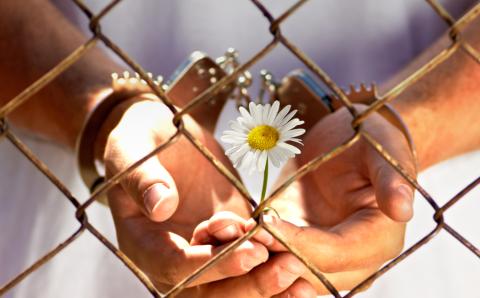I’ve heard it over and over from pastors and elders in the Christian Reformed Church. As a decreasing number of young people come forward for public profession of faith, too many display a general ignorance of the basic doctrines of the Christian, much less the Reformed, faith. They say they love Jesus but can’t really explain what their faith means.
In his book Soul Searching: The Religious and Spiritual Lives of American Teenagers, Christian Smith describes the religious beliefs of the majority of teens in the church as “moral therapeutic Deism.” It goes like this:
- A God exists who created and orders the world and watches over human life on earth.
- God wants people to be good, nice, and fair to each other, as taught in the Bible and by most world religions.
- The central goal of life is to be happy and to feel good about yourself.
- God does not need to be particularly involved in a person’s life except when needed to resolve a problem.
- Good people go to heaven when they die.
It’s plain to see that this version of Christianity has little to do with the Bible or with the Christian faith. But I have little doubt that it actually describes the lived faith of a large number of Christian Reformed teens. It seems that the church has failed to teach an adequate understanding of the Christian faith to many of its youth.
It was not always so. Many of us remember having to go to those midweek catechism classes, often taught by the minister. In third grade we learned our little summary catechism called the Compendium. Growing older, we memorized at least some Q&As of the Heidelberg Catechism. We had some basic theological foundation that could inoculate us to the banal religion of moral therapeutic Deism.
Most of us would not want to return to those sometimes dull classes and their rote memorization. What we have done instead is far worse. Over the last 20 years or so, a large number of congregations have abandoned catechism classes altogether and parents have given the theological education of their teens a low priority.
In many congregations Sunday school (which often consists only of telling Bible stories) and youth groups (often defined by activities and mission trips) are the only kind of education on offer for children and teens. Other churches don’t include children and teens in worship services where they can hear the sermon or participate in the drama of worship. By sending them out to be with their own age group, we send the message that worship is not really that important.
Teaching the theology or doctrine of the church to our teens is not optional. Theology is essential alongside the Bible for an understanding of the Christian faith. Doctrine is a key that unlocks the biblical treasury. To put it another way, doctrine offers us a map through the often confusing and trackless biblical terrain.
That’s why our confessions and creeds and catechism are so important. It’s theology that helps us understand that the God we meet in the Bible is the triune God, the original and eternal community of love who made this world and everything in it. It’s theology that enables us to grasp the enormity and depth of human rebellion and the covenant of grace by which God set out to save us. It’s theology that teaches us that Jesus Christ is the new human that God intended us to be, that his death and resurrection usher in a new creation, the kingdom of God, and that this world will be made new in him.
Dorothy Sayers once wrote that the gospel “is the greatest drama ever told . . . a terrifying drama of which God is the victim and the hero.” Evangelical theologian Kevin VanHoozer picks up on this with his book The Drama of Doctrine. Theology is what the church does when it takes up the biblical script and stages it for the church and the world to see, he says. But it’s more than a drama we watch for entertainment or inspiration; it’s a drama in which we are also actors every day. It is the drama of life in God’s world.
The Christian theological drama is a counter-story to the world’s story. It changes how we perceive our place in the world and transforms how we live. The Bible is the indispensable script, the underlying true story, but it’s the theological drama written over the centuries and told afresh in every generation that enables the biblical story to come alive in every age.
The 16th century Heidelberg Catechism does so with the ringing words of Q&A 1: “I belong, in body and soul, in life and in death, to my faithful Savior Jesus Christ. . . .” The catechism goes on to provide a powerful outline—guilt, grace, gratitude—of how we are to live into that belonging. Did you ever stop to think how important it is, for example, that the law of God comes under the rubric of gratitude? Law and gospel coalesce, obedience becomes freedom. That’s the kind of important insight doctrine can give.
More recently in the CRC we have another treasure that tells the drama of Christian theology even more vividly, the contemporary testimony “Our World Belongs to God.” In stirring, poetic language, it tells the biblical story as the drama of life in this world that belongs to God.
In the contemporary testimony we discover that God is not a benevolent deity out there somewhere but a divine community of love intimately and deeply involved with the world God made. Sin is not some unfortunate mistake but an act of radical rebellion against our Creator that infects every aspect of our lives. Salvation is not just that Jesus died for our sins, but that he, as our human brother, brings us into the fellowship of our Abba Father as adopted children through the Holy Spirit. Jesus Christ, now enthroned as Lord and King, calls us to share the message of his saving love and to bring the transforming power of his kingdom into every area of life. And no matter how the powers of evil seem to flourish, we are people of hope, looking for a new heaven and a new earth purged of sin, injustice, pain, and death.
That’s the Christian drama! It’s exciting, it’s transforming. It challenges our minds, feeds our souls, warms our hearts, and stimulates our imagination.
It is the task of the CRC to discover new ways to make that theological drama real for our teens. Our most recent synod called on Faith Formation Ministries to report on the feasibility of new curriculum materials. Hopefully, this will include catechetical materials as well. We can do this at a time when we have new tools—digital technology and the Internet—with which to accomplish this important task. We have access to a variety of media that can deliver imaginative and engaging teaching materials to our churches and our homes.
We have the world’s greatest drama to excite our teens, and we have the technological tools to deliver it to every church and every home. What remains is the commitment of parents and congregations to expect our youth to have that drama of doctrine in their spiritual DNA, and to provide the financial and pedagogical resources to make it happen.
Discussion Questions
- What do you think accounts for the church’s failure to adequately teach its young people the basics of the Christian faith? How does your own church do at this task?
- How does theology help us understand “the drama of life in God’s world”?
- The catechism uses the outline of guilt, grace, and gratitude. How does that to help us understand the overarching story of salvation in God’s Word?
- Many Christian Reformed folks have memorized Q&A 1 of the Heidelberg Catechism, and it is often printed in the service outline at funerals. What other treasures have you found in the creeds and confessions of the church?
About the Author
Len Vander Zee is a retired CRC pastor now serving as interim minister of preaching at Church of the Servant CRC in Grand Rapids, Mich.









